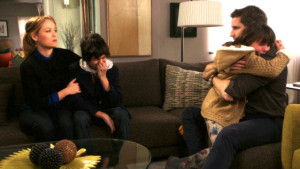by Jen Kogan
Here’s the story. Julia and Joel have always been the couple you can count on until this sixth and final season of NBC’s Parenthood. Lately, they’ve been missing each other since Julia quit her corporate law job to stay home with the kids and Joel went back to work. Now, they can’t seem to communicate or even understand each other. The stresses pile on and Julia turns away and kisses someone. Cue to couple therapy where they both sit perched uncomfortably; miserable on the requisite sofa. The bespectacled therapist doesn’t stand a chance. As soon as we return from the next commercial, the kids are getting the news about the impending divorce. Why do television couples in therapy seem to give up so quickly? Better yet, why is couple therapy on the small screen depicted with such a lack of connection and warmth?
We real-life therapists get to see a different story. Sitting in my chair, I work with real people who show up (mostly) because they want to learn how to connect with their partner. They reach out because they feel worn down or scared by the force of their own reactions. They know they want things to be different. The process of couples therapy can help uncover the stories they’ve been lugging around for years.
These stories can feel weighty but they can also help forge connections. Asking a couple how they met can shed important light in an initial session. Often, even the most disheartened pair will brighten as they tell their “love story.” The same can be true when mapping out each partner’s family tree with a genogram. For the speaker, it widens the lens to include a cast of many characters while simultaneously allowing their partner view him or her with compassion. A helpful spouse or partner can also help fill in the blanks or add perspective if conflict is not too high at the moment.
Another way stories can help us connect is with John Gottman’s concept of ‘love maps‘ Love maps help us acquire knowledge about each other’s inner world in a light-hearted way. Even if a couple has known each other since the first Bush administration, chances are there’s a lot more to discover now. Gottman suggests couples check out each other’s stories by asking open-ended questions. There is even a love map app couples can buy which offers a host of questions to ask. There is much individual work that lives inside couples therapy. Learning how to tune into your own story and develop strategies to manage and be with strong feelings is imperative. Equally important is knowing and accepting each others’ stories. Here in the real world where there is no commercial break, relationships flourish when one feels truly seen and heard by their mate.

Responses